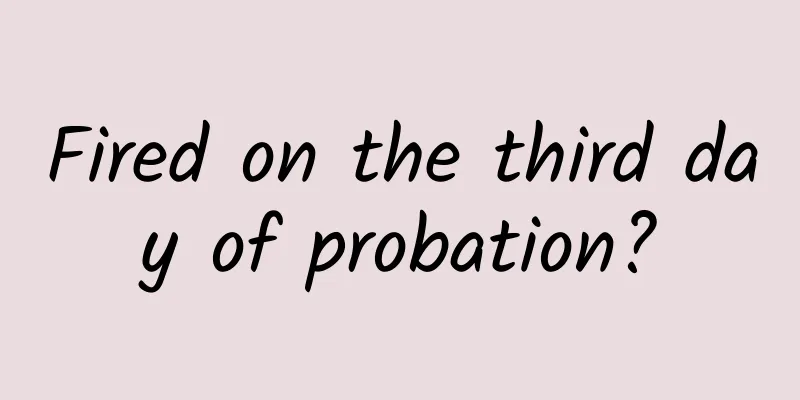Fired on the third day of probation?

|
Recently, there was a very popular post on the V2EX forum. An iOS developer who jumped from a small startup in Shanghai to a first-tier Internet company in Hangzhou was fired on the third day of his probation period. He said, "In a startup, one person might be responsible for an app, but now iOS has five or six people, it's easy." Therefore, the leader thought that he was "not a cultural fit." We have no way of knowing the truth of the matter. Regardless of whether this shocking "cultural incompatibility" was the real reason, the company's Tech Leader and HR both believed that this developer was not the employee they wanted, so it would be better to fire him quickly and part ways as soon as possible. To be honest, what kind of employees does a fast-growing company need? The first core team members of a startup company usually come from the founder's circle of friends. They have similar backgrounds, similar styles, and are familiar with each other. However, when the company goes from 0 to 1, it is necessary to start hiring people outside this circle. Unfortunately, most company leaders are not ready. They are not ready to grow and change their concepts and culture. In fact, they have already implicitly accepted group thinking. Aditya Agarwal was one of the first 15 employees of Facebook. Within six years, he was promoted to Director of Product Engineering, leading 2,000 employees to serve 700 million users. In 2012, he joined Dropbox and is currently the VP of Engineering, leading 200 employees to maintain the information security of 200 million users. From a programmer to a technical manager, Agarwal has a lot of experience in managing a company during its rapid growth period. He believes that Tech Leaders need to break the existing model, build a team, and then break it. Therefore, it is necessary to expand the scope of recruiting talents, jump out of your circle of friends, and change the way of interviewing. You must know that someone who has written three great iOS apps may not give you a satisfactory answer on the whiteboard, and the recruitment manager does not need to spend time checking the carefully crafted assignments submitted by candidates. In order to efficiently recruit the right technical talent, senior engineers at Dropbox evaluate candidates in this way: "Tell me about three systems you have worked on, what you did and what you didn't do." It is not difficult to judge whether someone can write code quickly and build a system scale. However, in the stage of rapid growth, the more important requirement for engineers is to have enough enthusiasm to realize the company's technology and products. Agarwal believes that the three most important qualities that candidates need to have are: 1. Learn quickly; This means that if there are not enough iOS engineers in the team, the leader will choose to "let someone in the team learn it!" Breaking the existing model: thinking that one can only work on a specific platform is the key, although it will be painful, but you have to pay the tuition for it. This is how Dropbox grew from 3 or 4 iOS engineers to 25-30. A fast-growing company may have a huge influx of users every day, and the products and devices seem to be humming. Hyper-fast growth necessarily requires expanding expertise outside of one's own field, both for the company and the individual. Holding back will hinder the rapid development process. “You come in, write a piece of code, and think you’re awesome. Then you’re given more responsibility, and suddenly you don’t know anything.” This is a career cycle. The key is not to get complacent when you are doing well, and not to get discouraged when you are not doing well. Generally speaking, the first engineer of a project is the one who influences the project culture. An expert with a strong passion for technology will not be defeated by small failures, but can gather a team around him. In a large company, you will focus on a certain work; but expanding your ability margin should be the first factor for people to choose a startup. A fast-growing company will give employees more opportunities to learn new skills, and if they are strong enough, they will grow into experts. To be an expert in this environment, you need to: 1. Expand your skills and accept failure. As Agarwal puts it: "We keep repeating that the best skills you can learn at Dropbox are cross-functional. Learn web code, iOS development, backend!" If someone can’t clearly and simply describe what they’re passionate about, it’s either because they’re not really interested in it, or because they simply can’t “explain” it - the latter of which is actually a big problem. In a fast-growing company, employees need to communicate, coordinate and make plans in addition to execution. Especially as a programmer, you must not just focus on coding, but understand the entire company's structure, business model and direction. Thinking clearly and communicating clearly are the most important leadership qualities. The company needs to create an environment that is as transparent as possible. At the same time, an employee who is good at communication should: 1. Ask more questions and "harass" your boss more often. Don't be silent. |
<<: APP promotion: digging into those niche promotion channels
>>: How to A/B test your app icon
Recommend
15 Free Ways to Promote Your Business Online
I have been engaged in the Internet industry for ...
Apple cuts iPhone X production by another 6 million units, bringing total to 75 million
[[223748]] The iPhone X, a narrow-framed phone la...
How much does it cost to be an agent of the Hebi Ticketing Mini Program? What is the quote for Hebi Ticketing Mini Program agent?
How much does it cost to be an agent for a ticket...
How to quickly acquire and convert customers through online operations?
The traditional education and training industry h...
What is image promotion? How to do image promotion?
In the Internet age, image display ads are becomi...
KOL marketing IPization!
This is a golden sentence said by the star Ning J...
From Lao Luo's first Douyin show, let's look at the three key points of live streaming sales
Everyone knows that e-commerce live streaming is ...
7 essential skills for operators - Business analysis is a high-level capability for operators
1. What is business analysis capability? Business...
Android BT Magnet Searcher v3.5 Multi-engine
The interface is the same as Little Magnet, but w...
My practical experience in Android development
I have always wanted to write an article summariz...
The most complete! 13 tricks for selling goods through live streaming
I believe that the first time many people heard t...
iOS 16 Beta 4 new features and improvements
Apple has launched iOS 16 Beta 4 for developers. ...
How to efficiently acquire seed users? Baidu's senior operations manager shares these 4 methods with you!
This is a relatively new product and there are no...
Mobile phone APPs forged health codes at will, and the police have intervened in the investigation
[[375448]] It has to be said that some people hav...
How much does it cost to rent a server with 100G bandwidth in Nanjing?
How much does it cost to rent a server with 100G ...









